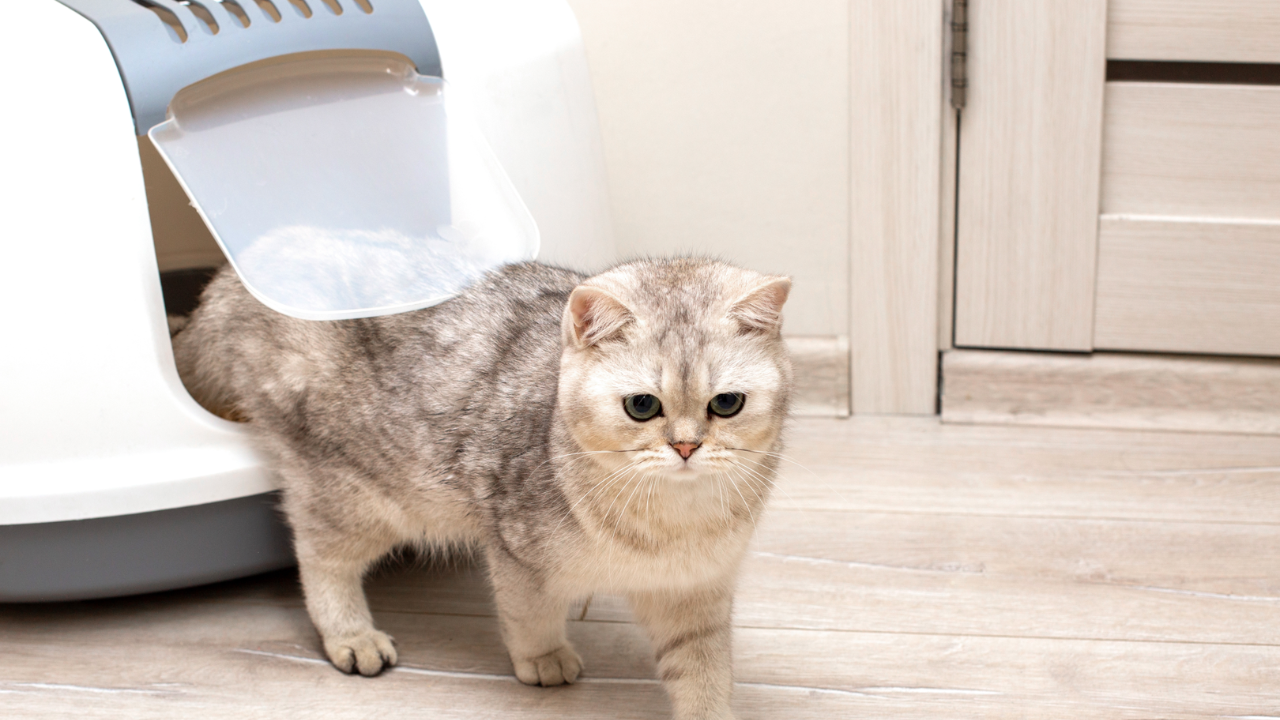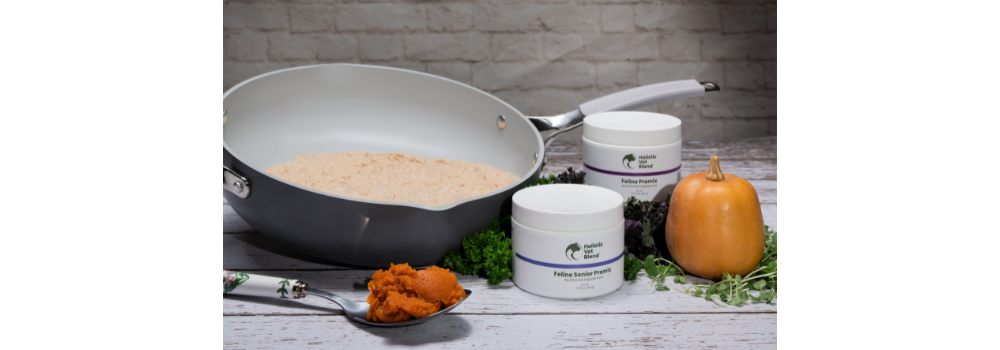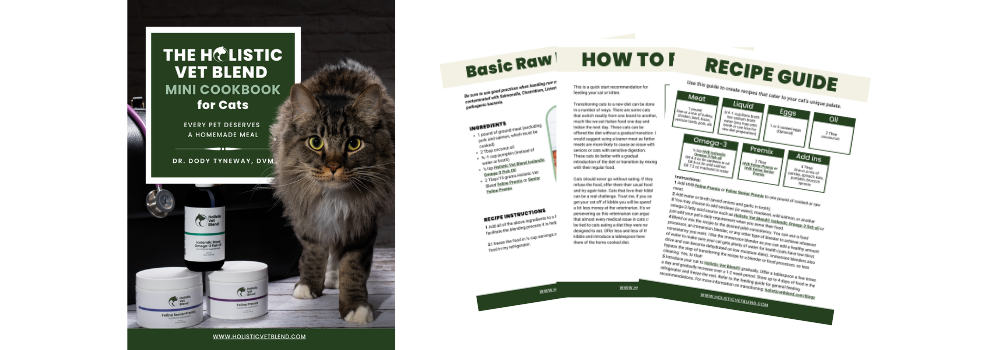
As a holistic veterinarian with over 30 years of experience, I've seen a myriad of health issues in our feline friends. One common yet often overlooked problem is constipation in cats. Today, we'll delve into the causes and effects of this condition and discuss how we can manage it through diet and lifestyle changes.
What are the signs of constipation?
- spending a lot of time in the litter box
- straining or crying in the litter box
- abdominal pain (may resent being picked up)
- lethargy and vomiting
- passing hard or dry feces
- decreased appetite
- blood in the stool (less common and may reflect blood incited from straining, much like hemorrhoid in humans)
- rarely intermittent liquid stool passing in severe cases
What is the difference between constipation and obstipation?
Constipation, put simply, is the infrequent or difficult passage of feces. If a cat's constipation progresses to the point that they lose the ability to defecate, it is considered obstipation. These cats may progress to having a condition known as megacolon. They have lost the functional ability to defecate and often need surgery.
Some cats with constipation that have progressed to obstipation will develop a very distended colon full of weeks of rock-hard stools they have not passed. This is known as a megacolon. Some of these cats will actually have some liquid stool that may pass around the hard feces, which can be confused with diarrhea.
The only way to relieve an obstipated cat is to have a veterinarian give an anesthetic and remove as much of the blocked stool as possible. The longer the stool is present, the more damage it will do to the nerve supply to the digestive tract. It's important to be on top of your cat with constipation to prevent this from happening and especially to avoid surgery.
The surgery that is done to remove the distended colon that has no functional capacity to move stool is called a subtotal colectomy. It is a major surgery and one that is best prevented.
How many bowel movements per day should a cat have?
In my 30 years of experience as a holistic veterinarian, one question that often comes up is about the regularity of a cat's bowel movements. The answer may surprise you! On average, a healthy cat should have on average one bowel movement per day. This can vary based on diet, hydration level, and individual health factors.
Dogs go 2-3 times per day, but we are usually very much aware when they go! It can be easy to miss constipation in cats, especially in a multicat household.
What causes cat constipation?
Cats may have a history of prior trauma to the pelvis or spine that damages nerves or the pelvic bones and interferes with the ability to defecate.
Many cats with constipation have diseases, such as kidney disease, that affect hydration which creates a drier and more difficult stool to pass. Other causes include medication, post-anesthesia, or diseases that affect the motility of the gastrointestinal tract.
Behavioral issues such as stress around the litterbox created by other cats in the household. The act of defecation makes cats vulnerable, and they will avoid going if there is a rival cat in the household that is intimidating them. Associating the litterbox with pain is another behavioral cause of not using the box. Cats that have arthritis pain and difficulty posturing in the box may avoid going and/or avoid the box.
Chronic kidney disease is one of the most likely causes of a constipated cat
Chronic renal failure affects the kidneys' ability to concentrate urine, leading to increased urination and thirst. In the long run, this can dehydrate the cat, causing constipation.
I find that chronic renal failure cats benefit from added moisture in their diet either with regular subcutaneous fluids. I also like to use B12 injections as many of these cats are urinating a lot, and since B vitamins are water-soluble, they may be deficient in them. B12 is important for enterocyte health and can help these cats feel better in my experience. Many veterinarians are willing to teach you how to give subcutaneous fluids and B12 injections at home if you ask. When making cat food, you can increase the amount of water added.
Inflammatory Bowel Disease (IBD)
IBD causes inflammation of the cat's gastrointestinal tract, altering gut motility. This can cause bouts of diarrhea and constipation.
Because kidney disease causes dehydration and electrolyte imbalances, it is the most likely medical condition to cause constipation. It's important to pay close attention to cats with kidney disease so that we can treat their constipation early.
Arthritis may also cause constipation
Cats with arthritis may have pain and difficulty getting in and out of the box and may avoid going.
Hyperthyroidism
Hyperthyroidism is a condition where the thyroid gland produces too much thyroid hormone. This can speed up gut motility, leading to diarrhea initially. However, over time, it can swing the other way, resulting in constipation.
Cats that are Overgrooming and Long Haired Cats with constipation
When cats are itchy, they may overgroom themselves. This will cause them to pass hair in their stool. I have seen this a lot. Another thing I see is a hairball actually causing acute vomiting as it can cause obstruction of food or ingesta like an intestinal blockage would.
Feline obesity
Overweight cats are more prone to constipation. They also exercise less, and we know that physical activity is important for the passage of feces. An overweight cat sleeping all day is like a human sitting on an airplane for too long.
The Root Causes and Predisposing Conditions
Like us, cats can suffer from constipation due to a variety of reasons. Here are some common medical conditions that predispose cats to constipation:
Dehydration
Cats, especially those on a dry-food diet, often don't drink enough water. This can lead to dehydration, a key factor in constipation. Without enough moisture, the cat's body absorbs water from the stool, making it hard and difficult to pass.
How can I encourage my cat to drink more water?
- Several bowls of clean water throughout the house
- Safe/private spaces for cats to drink
- Water fountains/moving water
- Unsalted bone broth or water added to food
Food for constipated cats
Moist food is most beneficial for all cats, especially cats with constipation.
Can dry food make a cat constipated?
Dry cat food can cause dehydration in cats that are susceptible. Cats naturally have a low thirst drive so they may not drink enough water to compensate for the dry diet. I see blog posts on the internet touting dry food for cleaning tartar off of a cat's teeth. This information is so far from the truth and makes me so angry! This would be akin to thinking that feeding your child hard candy would clean their teeth better than healthy food! Dry food has more carbohydrates in it (think sugar) and is more likely to cause calculus buildup. I don't know if there is a study to prove this (who would pay for it), but I certainly know from over 30 years in veterinary practice this could be no further from the truth!
What to Avoid
Avoid feeding your cat a dry-food-only diet as it may lead to dehydration. Also, avoid foods high in grains and fillers, which can exacerbate digestive issues. Never attempt to give mineral oil by mouth as this may get aspirated into the lungs. Also, avoid over-the-counter laxatives for humans as these can be toxic to pets.

What to Include
A diet rich in moisture and high-quality proteins is ideal. Canned, raw, or semi-moist foods are excellent choices. Moreover, adding soluble fiber such as pumpkin or winter squash baby food to your cat's diet can help manage constipation.
The Role of Fiber
And remember, until your cat is 5% dehydrated, your veterinarian can't detect it, so you can never assume they are not dehydrated until they are actually so dehydrated that they are obviously ill.
Fiber adds bulk to the stool, absorbing water and helping to push the stool through the digestive tract. However, it's not a one-size-fits-all solution. While some cats with mild and early constipation benefit from more fiber, it may worsen advanced cases.
I remember one of my Traditional Chinese Medicine mentors saying that fiber can make things worse, explaining that there has to be water in the river or the boat will not go! Enough said.
Insoluble vs. Soluble fiber
Insoluble fiber is bulking fiber. Think cellulose. Insoluble fiber increases the passage of feces by expanding in the intestine and stimulating peristalsis. This is considered "bulking" fiber. It can also increase water content in the colon, which may also help pass fecal passage.
Soluble fiber is fermented by the gut microbes that release short-chain fatty acids, which benefit the cat's gut enterocytes. When dietary fiber is fermented, it does wonderful things for gastrointestinal health and the microbiome. Butyrate, a short-chain fatty acid, will increase peristalsis.
Pet food labels and Fiber-rich foods
It's important to have soluble fiber that is fermentable by the bacteria in the gut. A healthy balance of both soluble and insoluble fiber is important. Unfortunately, pet food labels only list Crude Fiber content which does not separate soluble and insoluble fiber. Ideally, you would have both, but soluble fiber is so important as it nourishes a healthy microbiome, and this is impossible to tell from a pet food label that only lists crude fiber.
Cats that have poor motility and megacolon are losing the function of peristalsis in their colon. So giving fiber is no longer helpful and is actually problematic. These cats need a low-residue diet that is highly digestible.
Bulk-forming Laxatives
We love fiber because it is natural. But remember, if a cat has not defecated for days, adding more fiber to the diet may not necessarily help and may hurt.
First Steps If You Suspect Constipation in Cats
If you suspect your cat is constipated, don't panic. If symptoms persist and your cat has not gone for 2-3 days, consult a vet. Make sure you know whether or not your cat is urinating, as some cat owners confuse straining to urinate with constipation. Make sure you observe for yourself that your cat is producing urine if another family member reports "constipation." Straining and not producing urine, in the case of a urinary tract blockage, is an emergency. Your vet can easily detect a urinary or fecal blockage/obstipation with a physical examination.
The first action step to take if your cat is on a dry food diet is to try and increase its water intake by mixing wet food into its diet or offering some unsalted bone broth or water. Here's the link to the bone broth recipe. It's not the time to push a diet change when your cat is sick.
Consider adding some pumpkin or winter squash baby food to wet food if your cat is on a wet food diet. It's not uncommon for cats to experience constipation after anesthesia. Be sure to let your veterinarian know if this is the case.
If symptoms persist and your cat has not gone for 2-3 days, consult a vet. Ask your veterinarian if you can try something over the counter, such as Miralax, which is considered to be very safe even in geriatric cats.
Your veterinarian may recommend Miralax sprinkled in your cat's food. Many cats will accept this in their food if you add tiny amounts and gradually increase to effect. The dose of over-the-counter Miralax that is prescribed by veterinarians for an early constipated cat is 1/8 to 1/4 tsp per day.
When in doubt, make an appointment for your veterinarian to do a physical exam which will reveal if there is a buildup of fecal material in the colon. They can also prescribe a laxative in the short term until things are normalized. Avoid using commercially prepared enemas from the drug store as they can be toxic to pets. Additionally, giving an enema to your pet is a great way to get bitten, as constipated cats do not take to them mildly. Leave it to your veterinarian as they can also give something for the discomfort and proceed safely.
Remember, every cat is unique, and what works for one might not work for another. Always consult with your vet before making major changes to your cat's diet or lifestyle. Our Holistic Vet Blend products are designed to support your cat's overall health, including digestive health. Give them a try today!
What is the best fiber for cats with constipation?
If your cat is passing stools that are small and dry, and you have already switched to canned food, you can try adding some canned pumpkin. My favorite way to do this is to buy either pumpkin or winter squash baby food. It's easy to find year-round, and you won't waste a whole can of pumpkin.
- Canned pumpkin: 1-2 Tbsp per can of food
- Psyllium husk: a pinch up to a tsp added to meals
Canned Food for constipated cats
Encourage your constipated cat to eat canned food. Read this blog post about: Tips for changing your cat's food when you have a picky eater
Time To Go To The Veterinarian
What will my vet do for my constipated cat?
Some cats with constipation related to a medical condition may need a prescription or veterinary advice on how to use a laxative like polyethylene glycol/Miralax for the long term or a medication like Cisapride to help stimulate the motility of the intestinal tract. I am not a fan of lactulose as cats tend to hate it when you try to syringe it down, and you have to give a very large volume frequently for it to work.
Just like us, our feline friends thrive best with a balanced diet, adequate hydration, and regular exercise. This is where our Holistic Vet Blend products come into play. Crafted with quality ingredients and aimed at healthy digestion and promoting overall health, these products help maintain a regular digestive rhythm in your cat.
Remember, fewer than three bowel movements per week could indicate a problem like constipation. If you notice any irregularities or changes in your cat's bowel movements, it's always best to consult with your vet. Let's work together to keep our pets healthy and happy!
As a holistic veterinarian, I believe in the power of preventive health care and proper nutrition. Holistic Vet Blend has Psyllium added to the nutrient premix to facilitate digestion by providing soluble, fermentable fiber for a healthy microbiome. The Holistic Vet Blend Feline Senior formula also has increased B vitamin levels as seniors tend to be deficient. B vitamins have been known to assist with digestion and metabolism. There are also optional add-ins to the recipe, such as pumpkin, winter squash, and vegetables such as spinach, kale, and parsley, which provide fiber. When you make your own cat food, you can add additional liquid to ensure hydration. You can download a free mini cookbook here for a description of the blend and some recipes.

With the right knowledge and tools at hand, we can ensure our feline friends lead healthy, comfortable lives. A constipated cat is an uncomfortable cat. Treating any underlying cause of constipation and feeding a healthy wet diet will benefit cats and keep them as healthy and comfortable as possible.












